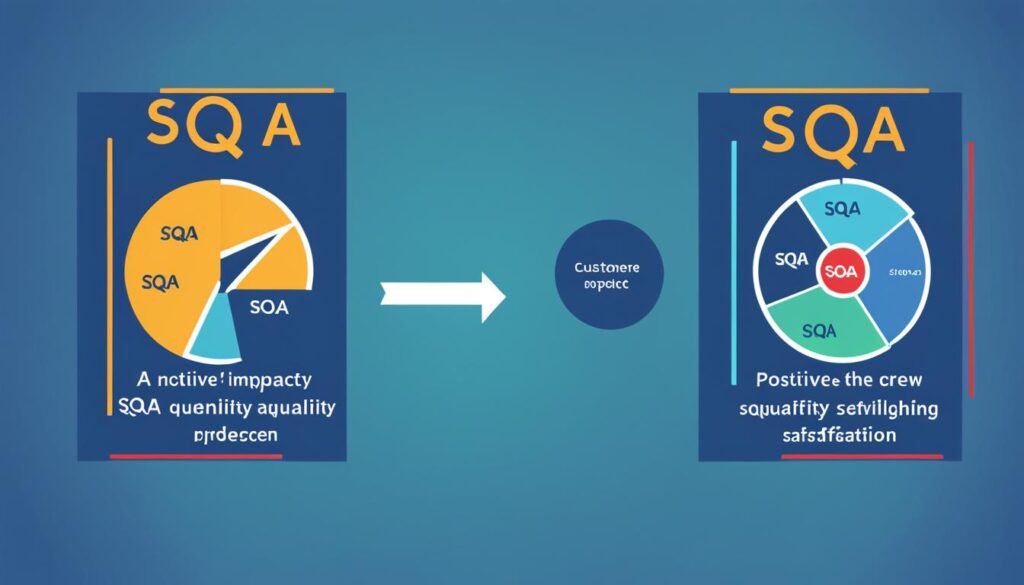Welcome to our series of articles dedicated to software quality assurance (SQA). In today’s world, with software applications being essential in our personal and professional lives, ensuring their quality is of utmost importance. Throughout the upcoming articles, we will explore the fundamentals of SQA, including its key principles, implementation strategies, different methods, metrics, challenges, and other related topics.
SQA is a methodology that ensures software products meet a predefined set of quality standards. It is an integral part of the software development life cycle, functioning parallel to the development process. SQA aims to identify issues early on by testing every block of the software process. It evaluates both internal aspects like efficiency, reliability, and cost of maintenance, as well as external attributes like structure, complexity, readability, flexibility, testability, and coding practices.
Key Takeaways:
- SQA ensures software products comply with predetermined quality standards.
- It tests every block of the software process to identify issues early on.
- SQA evaluates both internal and external aspects of software quality.
- Efficiency, reliability, cost of maintenance, structure, complexity, readability, flexibility, testability, and coding practices are key factors evaluated in SQA.
- Ensuring software quality is crucial in today’s digital age.
Principles of Software Quality Assurance
Implementing software quality assurance (SQA) involves adhering to key principles that ensure effective implementation and maintenance of the best quality standards. These principles serve as a foundation for establishing robust SQA practices and drive the delivery of high-quality software products.
Defect Prevention
Defect prevention is a fundamental principle of SQA. It focuses on identifying and addressing potential issues early in the software development lifecycle. By proactively addressing defects, organizations can avoid costly rework, minimize project delays, and enhance overall software quality.
Continuous Improvement
Continuous improvement is a core tenet of SQA. It involves consistently monitoring and improving software quality throughout the development process. By gathering valuable feedback, analyzing performance metrics, and implementing necessary changes, organizations can continuously enhance their software products and adapt to evolving customer needs.
Stakeholder Involvement
Stakeholder involvement is crucial in SQA. It promotes collaborative efforts and effective communication between development teams, quality assurance specialists, and other project stakeholders. By involving stakeholders throughout the development process, organizations ensure that everyone’s perspectives and requirements are considered, resulting in higher quality software products.
Risk-Based Approach
A risk-based approach is essential in SQA. It prioritizes the identification and mitigation of the most significant risks in the software product. By analyzing potential risks, organizations can allocate resources effectively and implement targeted quality assurance measures to address potential vulnerabilities.
By following these principles, organizations can establish a strong foundation for their SQA practices, ensure software quality control, and adopt best practices in quality assurance in agile software development.

| Principle | Description |
|---|---|
| Defect Prevention | Focusing on identifying and addressing potential issues early in the software development lifecycle to avoid costly rework and delays. |
| Continuous Improvement | Consistently monitoring and improving software quality through feedback, analysis, and adaptation. |
| Stakeholder Involvement | Promoting collaboration and effective communication between project stakeholders to ensure all perspectives and requirements are considered. |
| Risk-Based Approach | Identifying and mitigating the most significant risks in the software product to allocate resources effectively and address vulnerabilities. |
Implementing Software Quality Assurance
To implement software quality assurance effectively, we need to follow a structured approach. This involves defining quality standards, planning SQA activities, conducting reviews, performing testing, monitoring and measuring software quality, and continuously improving the SQA process.
Defining quality standards is important to establish the requirements, acceptance criteria, and performance metrics for the software product. This helps ensure that the software meets the predefined quality standards and delivers the desired outcomes.
Planning SQA activities involves developing a comprehensive plan that outlines the reviews, testing, and documentation activities. This plan also assigns responsibilities and sets timelines to ensure that the SQA activities are carried out efficiently.
Conducting reviews is a crucial step in identifying defects early in the development process. By conducting thorough reviews, we can spot and address any issues or potential problems in the software product, minimizing the chances of defects in the final deliverable.
Performing various types of testing, such as unit testing, integration testing, system testing, and acceptance testing, is essential to ensure that the software meets the defined quality standards. Each type of testing focuses on different aspects of the software and helps identify any functional or performance-related issues.
Monitoring and measuring software quality involves tracking defects, analyzing metrics, and conducting root cause analysis. This enables us to identify areas for improvement and take corrective actions to enhance the overall quality of the software.
Continuous improvement is an integral part of software quality assurance. By analyzing the results, identifying areas for improvement, and implementing changes, we can continuously enhance the SQA process and ensure that the software products meet or exceed the quality standards.

| Metric Type | Examples |
|---|---|
| Product Metrics |
|
| Process Metrics |
|
By effectively measuring software quality using reliable metrics, analyzing and interpreting the collected data, benchmarking against industry standards, and embracing continuous improvement, we can enhance our SQA practices and deliver high-quality software products that meet customer expectations and drive business success.
Software Quality Assurance in Practice
Software quality assurance in practice encompasses a range of activities and approaches aimed at ensuring the delivery of high-quality software products. These practices include software testing, defect management, consideration of software quality attributes, and the implementation of various SQA methodologies.
Software Testing
Software testing is a critical aspect of software quality assurance. It involves the systematic examination of software components and functions to identify any deviations from the desired behavior. Functional testing ensures that each feature or functionality of the software performs as intended. Performance testing evaluates the software’s responsiveness, scalability, and resource utilization under different conditions. Usability testing focuses on assessing the software’s user-friendliness and intuitiveness, ensuring an optimal user experience.
Defect Management
Defect management is an integral part of software quality assurance. It involves the identification, tracking, and resolution of defects or issues that arise during the software development process. By actively managing defects, organizations can address them promptly, reducing the impact on software quality and minimizing potential risks. This ensures that the final software product meets the desired quality standards.
Software Quality Attributes
In addition to testing and defect management, it is essential to consider various software quality attributes to ensure a high-quality product. These attributes, such as correctness, maintainability, portability, testability, usability, reliability, and efficiency, define the overall quality of the software. By focusing on these attributes, organizations can develop software that is reliable, easy to maintain, portable across different platforms, and performs efficiently.
SQA Methodologies
Several SQA methodologies provide frameworks for managing and improving software quality. Examples include the software quality defect management approach and the software quality attributes approach. The defect management approach involves techniques such as defect leakage matrices and clear control charts to track defects and ensure their effective resolution. The software quality attributes approach emphasizes analyzing quality factors to identify areas for improvement and enhance the overall software quality.
By implementing these practices and methodologies, organizations can deliver reliable and robust software products that meet customer expectations and industry standards.
Importance of Software Quality Assurance
Software quality assurance (SQA) plays a crucial role in ensuring that software products meet customer expectations, deliver reliability, and provide a seamless user experience. By implementing SQA practices, organizations can reap several benefits and gain a competitive edge in the market.
Early Issue Identification: One of the primary benefits of SQA is the ability to identify and address potential issues early in the software development process. By conducting thorough testing and quality checks, we can proactively detect and resolve defects, reducing the cost and effort required for fixing them at later stages.

Improved Software Quality: SQA ensures that software products meet predefined quality standards, resulting in high-quality software that is reliable, efficient, and performs as expected. This improves the overall value and usability of the software, leading to increased customer satisfaction.
Risk Reduction: Implementing SQA helps reduce risks associated with software development by addressing potential issues early on. By following best practices and performing comprehensive testing, we can mitigate risks and minimize the chances of software failures or security vulnerabilities.
Enhanced Customer Satisfaction: Reliable software products lead to increased trust and loyalty from customers. By delivering high-quality software that meets desired standards and offers a smooth user experience, organizations can enhance customer satisfaction, driving repeat business and positive word-of-mouth recommendations.
Implementing SQA practices leads to reliable and robust software solutions that meet the needs and expectations of users.
To summarize, software quality assurance is vital in ensuring the reliability, efficiency, and customer satisfaction of software products. By identifying issues early on, improving software quality, reducing risks, and enhancing customer satisfaction, organizations can deliver high-quality software solutions and gain a competitive advantage in the market.
Challenges in Software Quality Assurance
Software quality assurance (SQA) presents a unique set of challenges that organizations must address to ensure successful implementation. These challenges encompass various aspects, including:
- Data Accuracy and Reliability: Ensuring the accuracy and reliability of data is essential for effective software quality assurance. Organizations must establish robust processes to collect, validate, and verify data, minimizing errors and inaccuracies that can lead to compromised quality assessment.
- Selecting Appropriate Metrics: Choosing the right metrics is crucial for evaluating software quality accurately. Organizations need to identify metrics that align with their specific quality goals and provide meaningful insights. By selecting appropriate metrics, they can effectively measure and track the desired quality attributes.
- Consistency in Measurement Practices: Maintaining consistency in measurement practices across different projects is vital for reliable comparison and continuous improvement. Organizations should establish standardized measurement criteria, methodologies, and procedures to ensure consistent and objective evaluation of software quality.
- Managing Complexity: Software development often involves complex and intricate processes, making managing complexity a significant challenge in software quality assurance. Organizations must adopt strategies and methodologies that can effectively handle the intricacies of software development, ensuring that quality is maintained despite the complexities involved.
To address these challenges, organizations need to establish robust data collection processes, define clear and relevant measurement criteria, standardize practices and procedures, and effectively manage project complexity. By overcoming these challenges, organizations can ensure the accuracy and usefulness of measurement results, driving continuous improvement in software quality.
Example Table: Challenges in Software Quality Assurance
| Challenges | Key Considerations |
|---|---|
| Data Accuracy and Reliability | Implement robust data collection processes Ensure data validation and verification Minimize errors and inaccuracies |
| Selecting Appropriate Metrics | Identify metrics aligned with quality goals Choose metrics that provide meaningful insights Measure the desired quality attributes |
| Consistency in Measurement Practices | Establish standardized measurement criteria Define clear methodologies and procedures Ensure consistent and objective evaluation |
| Managing Complexity | Adopt strategies to handle software development complexity Maintain quality despite intricate processes Address challenges posed by complex projects |

Note: The image above visually represents the challenge of managing complexity in software quality assurance. It serves as a visual aid to enhance the understanding of the section’s content.
Software Quality Assurance vs. Quality Control
To truly understand the difference between software quality assurance (SQA) and quality control (QC), let’s dive into their distinct roles and objectives.
Software Quality Assurance (SQA)
SQA focuses on ensuring that the entire software development process is set up to produce quality software. It takes a proactive approach, emphasizing defect prevention, continuous improvement, and stakeholder involvement throughout the development lifecycle.
“Preventing defects and errors from occurring in the first place.”
SQA involves setting up robust processes, methodologies, and best practices to prevent defects and errors from happening. By continuously monitoring and improving the development process, SQA helps minimize risks and deliver high-quality software products.
Quality Control (QC)
In contrast, QC is more hands-on and focuses on checking the actual product for quality. It takes a reactive approach, aimed at identifying and fixing defects that have occurred in the final software product.
“Finding and addressing defects after they have occurred.”
QC involves conducting various testing activities, such as functional testing, performance testing, and usability testing, to ensure that the software meets quality standards. It involves rigorous inspection and verification to catch and rectify any issues or defects.
SQA and QC Working Together
Both SQA and QC are essential components of software quality management. While SQA focuses on preventing defects from occurring in the first place, QC ensures that any defects that do emerge are detected and addressed.
By combining the two approaches, organizations can establish effective quality management processes, from the early stages of development to the final product delivery. This collaborative effort helps ensure the delivery of high-quality software products that meet customer expectations, improve reliability, and enhance customer satisfaction.
| Software Quality Assurance (SQA) | Quality Control (QC) | |
|---|---|---|
| Approach | Proactive | Reactive |
| Objective | Defect prevention and continuous improvement | Defect identification and fixing |
| Focus | Entire software development process | Final product |
| Activities |
|
|
By understanding the roles and differences between SQA and QC, organizations can effectively implement software quality management practices that enable them to deliver reliable, robust, and high-quality software products.
Conclusion
In conclusion, software quality assurance (SQA) is an essential aspect of software development that ensures software products meet predefined quality standards and deliver a satisfying user experience. SQA involves the implementation of principles, methodologies, and techniques to prevent defects, continuously improve software quality, involve stakeholders, and prioritize risk management.
SQA plays a crucial role in delivering reliable and robust software solutions that meet customer expectations and drive business success. By following best practices in SQA, organizations can mitigate risks, enhance customer satisfaction, and gain a competitive advantage in the ever-evolving software industry.
Embracing software quality assurance is essential for businesses looking to deliver high-quality software products and stay ahead in the market. It allows companies to ensure their software meets the desired quality standards, delivers a seamless user experience, and fosters trust and loyalty from customers.
By prioritizing software quality assurance and integrating it into every phase of the software development life cycle, businesses can deliver software products that not only meet customer requirements but also surpass their expectations, establishing a strong reputation and driving long-term success.
FAQ
What is software quality assurance?
Software quality assurance (SQA) is a methodology to ensure that the quality of the software product complies with a predetermined set of standards. It involves testing every block of the software development process to identify issues early on.
What are the principles of software quality assurance?
The key principles of software quality assurance include defect prevention, continuous improvement, stakeholder involvement, and a risk-based approach.
How is software quality assurance implemented?
The implementation of software quality assurance involves defining quality standards, planning SQA activities, conducting reviews, performing testing, monitoring and measuring software quality, and continuously improving the SQA process.
What are the different approaches to software quality assurance?
The different approaches to software quality assurance include the traditional approach, agile approach, DevOps approach, Six Sigma approach, lean approach, continuous integration and continuous deployment (CI/CD) approach, and test-driven development (TDD) approach.
What is measurement in software quality assurance?
Measurement in software quality assurance is the process of quantitatively assessing various aspects of software development and testing to ensure the quality of the software product. It involves collecting relevant data, analyzing it, and using the insights gained to make informed decisions and improvements.
What activities are involved in software quality assurance in practice?
Software quality assurance in practice involves activities such as software testing, defect management, consideration of software quality attributes, and implementation of various SQA methodologies.
Why is software quality assurance important?
Software quality assurance is important as it ensures that software products are reliable, efficient, and meet customer expectations. It helps identify and address potential issues early in the development process, reducing the cost and effort required for fixing defects later.
What challenges are faced in software quality assurance?
Some of the challenges faced in software quality assurance include ensuring data accuracy and reliability, selecting appropriate metrics, maintaining consistency in measurement practices, and effectively managing the complexity of software development.
What is the difference between software quality assurance and quality control?
Software quality assurance focuses on preventing defects and ensuring the entire software development process is set up to produce quality software. Quality control, on the other hand, is more hands-on and focuses on checking the actual product for quality.
Q: What is the importance of software quality assurance?
Software quality assurance is important as it helps deliver reliable and robust software solutions that meet customer expectations, mitigate risks, enhance customer satisfaction, and gain a competitive advantage in the software industry.
Rick, our Software Quality Assurance Writer, is the creative force behind many of our insightful articles and course materials. His unique background in software development, fused with his natural flair for writing, allows him to convey complex QA concepts in a way that is both informative and captivating. Rick is committed to keeping abreast of the latest trends and advancements in software testing, ensuring that our content remains not just relevant, but at the forefront of the field. His significant contributions are instrumental in helping us fulfill our mission to deliver premier QA education.










